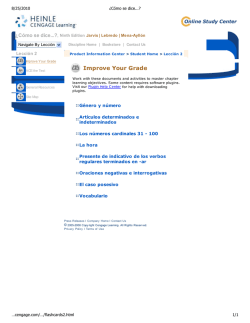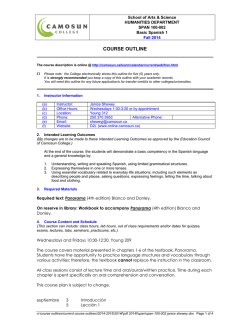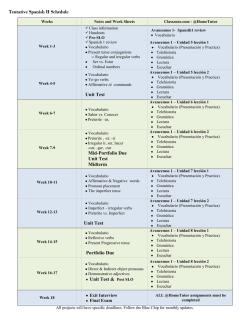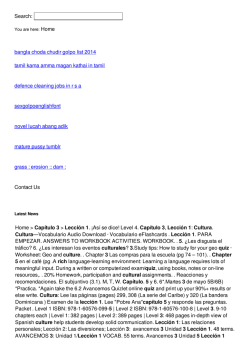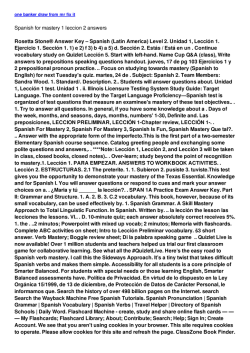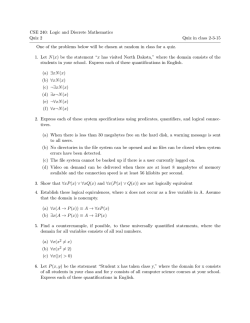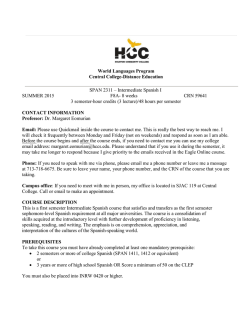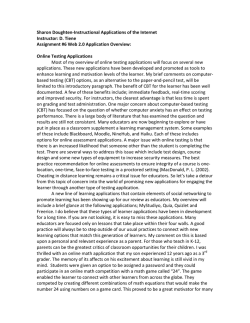
LIBRO: -Jarvis, Lebredo & Mena-Ayllón ¿Cómo se dice…? Textbook
ESPAÑOL II /Section 3334 Primavera 2008 Profesora: Sonia Sanchez Martes & Jueves 11:00 / 12:15pm O.139 E-mail: [email protected] Teléfono: 548-3678 Horas de Oficina : 12:30 – 2:00/ lunes 11:00 -12:30/miércoles 1:45-2:45 LIBRO: -Jarvis, Lebredo & Mena-Ayllón edition. Houghton Mifflin, 2005. ¿Cómo se dice…? Textbook,8th -Jarvis & Lebredo ¿Cómo se dice….?. QUIA ON-LINE Workbook & Laboratory manual OBJETIVOS • This course is designed to help continue developing your speaking, listening, writing and reading skills in Spanish with emphasis in communicative competence. • To read and understand written passages and demonstrate an ability to write well constructed compositions on assigned topics at a higher level. • To enhance cultural understanding and appreciation of the Spanish-speaking world such as history, geography, arts, traditions, etc. PROCEDIMIENTO: • Spanish is used in the classroom. Only in case of complex explanations, English will be used. • The text, music, video clip, and internet activities will be used for writing, oral, reading and listening activities. • Pair and group activities of dialogues and comprehensive exercises to reinforce structures learned in class will be regularly practiced. The point of these activities is to develop natural conversation, not just to get through the activity. Don’t rush through them; allow your partner to communicate with you and try to focus on the ideas and content. • Students will be called upon to speak in Spanish in the course of the class. Dictation, reading, and listening exercises will be used to develop the student’s competence in the language. • Weekly homework, writing assignments and a test after each chapter will be given. • Keep in mind that when you speak Spanish you will be making mistakes. The best way to eliminate these errors is not to worry and think hard about the grammar when you speak, but to continue to get more language input through listening, conversation, and reading. In time, you will become more acurate. Mi Consejo ( My advise): The most important thing in a language class is ACTITUD; to relax and have fun. Don’t worry if you don’t understand every word I say; just concentrate in getting the main idea. Nor should you worry about making mistakes. You will make fewer mistakes as your listening skills improve, so keep making every effort to understand. Don’t expect to be able to express yourself as well as in your native language. Don’t worry about your classmates making mistakes either. Some students will acquire Spanish more rapidly than others, but everyone will be successful in the long run. For now, minor grammatical or 1 pronunciation errors do not harm. Always listen to my feedback when I make comments or rephrase what a student has said in a more complete and correct manner. This is not done to embarrass anyone, but to give the entire class the chance to hear more Spanish spoken correctly. Finally, speak Spanish; avoid English. If you don’t know how to express an idea or word in Spanish ask me ¿Cómo se dice _____ en español? ( How do you say_____ in Spanish?) ASISTENCIA y RESPONSABILIDAD • Regular attendance and active participation are critical to the course grade. Students are expected to be on time and attend all classes. More than three unexcused absences will be considered excessive. After the third absence your grade will be lowered a letter grade. • Two lateness or leaving the class during the session without previous notice will count as one absence. • Students who disrupt the class with excessive talking, sleep or, work on other subjects other than Spanish, will be asked to leave the class and will be considered an unexcused absence. • If you have to miss a class, it is your responsibility to find out what material was covered during your absence and to hand in your homework and lab assignments on time. • Respect and civility are required in the class. Remember to turn off your cell phones/beepers before the class begins. Food is not allowed in the classroom. PARTICIPACION ORAL: • Because you will be graded on your daily oral participation, you are expected to attend every class session on time. Class participation grade is based on your daily class preparation and your active participation in class activities. TAREA Y LABORATORIO: • Homework and on-line lab assignments are an important part of your grade. For this course, an on line workbook and lab manual (QUIA) will be used. • In order to use your QUIA WORKBOOK AND LAB MANUAL, you need to create a QUIA account. But first of all, you are required to purchase a QUIA KEY (a password). You can do that either on-line (web site: http://books.quia.com) or in the bookstore. • QUIA assignments will be submitted online the date of your quizzes. All QUIA assignment missed is an automatic FAIL in this class. 5 points will be deducted from the final grade for each assigment that is either incomplete or late. LA NOTA • In SP12 we cover from chap. 7 to chap. 12 of the textbook; therefore, you have 6 quizzes. 6 Pruebas (q)…………….................... 40% QUIA Lab online…………………..… 10% Tarea online (hw)………………....… 10% Participación oral y tarea in class …..15% Examen Final (cumulativo)………..…25% Total ____________ 100 - Martes, 11 de marzo----------------------------- no hay clases. - Martes y jueves, 25 y 27 de marzo ------ --- no hay clases. - Martes, 20 de mayo Examen Final----------- ultima clase. 2 COURSE OUTLINE • Lección 7: - • Lección 8: - Vocabulario (p. 214,215,216) - ‘ser, ir, dar’ (p. 223) - ‘por’ y ‘para’ (226,227,228) - Puerto Rico (234, 235, 236) Vocabulario (p. 186,187,188) - Objeto Indirecto (p. 192, 193) Verbo: ‘gustar’ (p. 195,196) - ‘Hace’ (p. 198,199) Tiempo Pasado (p. 200,2001) - Números Ordinales (p.203) Costa Rica y Panamá (p. 208,209) - Objeto indirecto y directo (p. 220,221,222) - Verbos: E—I, O---U (p.224, 225) - Adverbios (p.229) • Lección 9: - Vocabulario (p. 240, 241, 242) - Verbos Reflexivos (p. 246, 247,248, 249) - Pretéritos Irregulares (p. 253, 254) - Pronombre Posesivos ( p. 252, 253) - Cuba y Republica Dominicana (p. 260, 261, 262) • Lección 10: - Vocabulario (p. 272, 273,274) - El imperfecto (p. 278, 279) - El imperfecto y el pasado (p.280, 281) - Venezuela (p. 290, 291, 292) • Lección 11: - Vocabulario (p. 296, 297,298) - El subjuntivo (p. 302, 303, 304, 305, p. 308) - Colombia (p. 314,315, 316) • Lección 12: - Vocabulario (p. 320, 321, 322) - ‘se’ (p. 332, 333) - El imperativo (p. 326, 327, 328) - Perú y Ecuador (p. 338, 339, 340) Lección 7 01-24 / 02-12 Lección 8 02-12 02-28 Lección 9 02-28/03-20 Lección 10 03-20/04-15 Lección 11 04-15/04-29 Lección 12 04-29/ 05-13 • Quiz # 1 • QUIA # 1 • Quiz # 2 • QUIA # 2 • Quiz # 3 • QUIA # 3 • Quiz # 4 • QUIA # 4 • Quiz # 5 • QUIA # 5 • Quiz # 6 • QUIA # 6 12 de febrero 28 de febrero 20 de marzo 15 de abril 29 de abril 13 de mayo • 15 de mayo -------------------- revisión • 20 de mayo -------------------- examen final 3
© Copyright 2026
